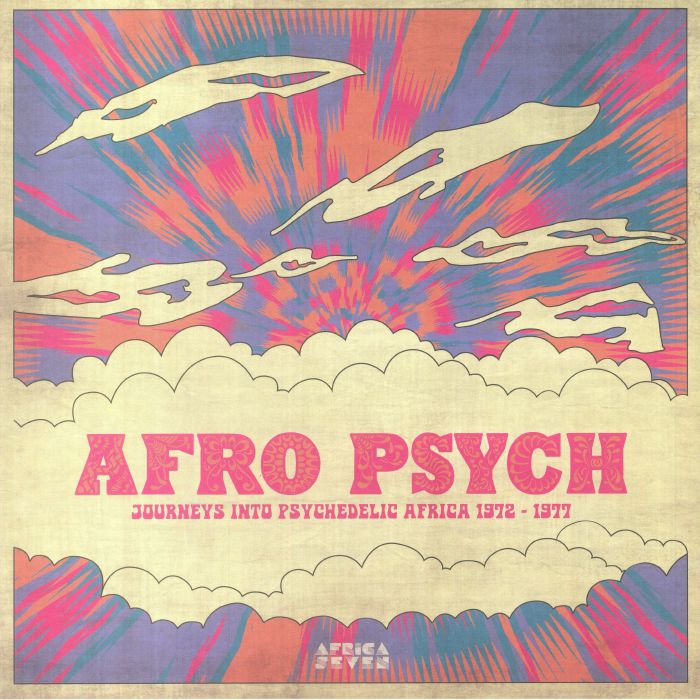Dusted Down – Afro Psych (Journeys Into Psychedelic Africa 1972 – 1977) (Africa Seven)
It all goes back to Lagos, 1972…

Afro Psych (Journeys Into Psychedelic Africa 1972 – 1977) (Africa Seven)
In Lagos, 1972, in the offices of Decca West Africa (DWA), an aspirational sales manager named Dave Bennett doodled a logo for a prospective record company. At the time – before the popularisation and commercialisation of what was labelled “world music” – most foreign-owned record companies operating in Africa were focusing almost exclusively on the importation of Western popular music, leaving local West African musicians with few clear avenues for mass distribution.
Nonetheless, Decca was one of the few labels to gauge the appetite for local music, releasing work by the likes of Haruna Ishola, Ebenezer Obey and most notably, Fela Kuti. DWA’s willingness to release work by these artists perhaps laid the groundwork for Bennett to go a step further with his own imprint. Bennett wanted to lose the London office’s influence on branding, marketing, and distribution; instead, he would move the centre of decision-making closer to the primarily Nigerian musicians and audiences whom it affected.
Thus, as a subsidiary of Decca West Africa (DWA), Afrodisia was born and swiftly became a large feature of the creative explosion from West Africa.
The label – which published eight of the nine tracks on this compilation – released over 200 records by the end of the decade. This domestically popular music – with influences from funk, highlife, traditional African music, and psychedelic rock by the likes of Jimi Hendrix – has had a slower path to widespread, international recognition than its contemporary genres like Afrobeat. Thankfully, listeners are now starting to delve into the abundance of great releases. This new compilation by Africa Seven is another terrific exploration.
A track by the famous Lijadu Sisters begins the collection. The song’s mixture of subdued, danceable percussion, funk bass, Yoruba lyrics, and a freewheeling guitar solo, is an apt introduction to the unique amalgam of influences contained within the compilation. We then have the excellent ‘Tax Drive’ by Oriental Brothers International. The track combines the tight, driving instrumentation of funk and the loose, free-wheeling guitar-playing of Hendrix.
The joyful, muscular ‘Boconor’ follows, its insistent, thrilling percussion backing the brilliant group vocals. The track, taken from Bunzu Soundz’s 1976 self-titled release with Afrodisia, is a great entry point into their music. Saxon Lee & The Shadows International take the reins for a 10-minute long funk composition on ‘Mind Your Business’. This once again captures this compilation’s unique capacity for being both tightly composed and loosely executed. The improvisations on hammond organ, electric guitar, and brass are a welcome addition.
Breaking from the established easy-going tone is the surprisingly heavy ‘Graceful Bird’ by War-Head Constriction. After a fairly modest opening, the track explodes into fuzzy, wah-laden guitars, and bass-heavy production that recalls the hard rock of Hendrix’s ‘Foxy Lady’. Lucas Tala’s ‘Moghie Nu Te Eka Tse Mu’ is a fast-paced groovy track accentuated by some great saxophone soloing. It’s also the only track released by the Sonodisc subsidiary, Sonafric.We then get a fairly daring incorporation of eccentric synth lines on Ariya’s ‘Aura (Aspiritual Emanation)’.
Considering how soon this was after Kraftwerk began to hit the mainstream, it’s an impressive creative application of a fairly recent technology. The exceptional free-jazz-influenced ‘Mbembe’ by Celestin Nyam may be the highlight for many listeners. The driving rhythm section serves as a great backdrop for the various soloists to improvise over. The group’s terrific interplay makes for a worthwhile listen.
Finally, we close with the infectious funk of Christie Azumah And The Uppers International’s ‘Aja Wondo’. It’s a triumphant end to a great compilation and a fascinating dive into the world of African psychedelia.
Noah Sparkes